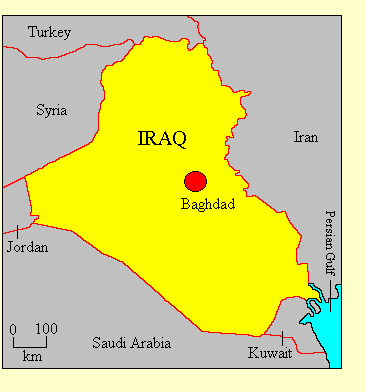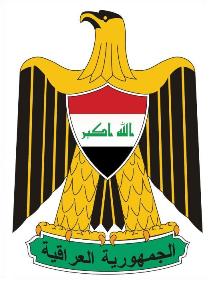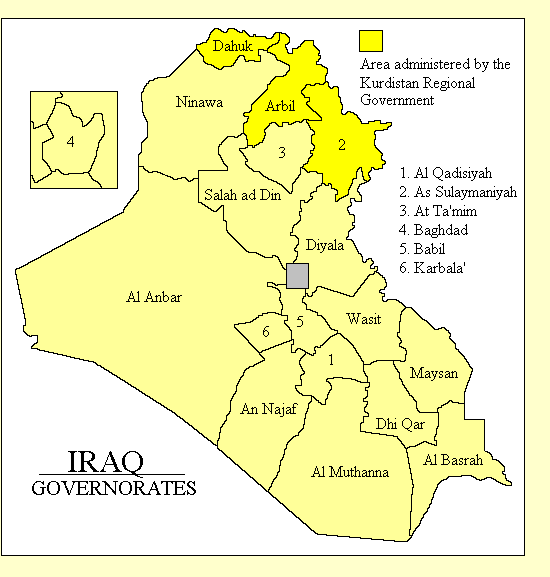

REPUBLIC OF IRAQ
• Official name: Al Jumhuriyah al Iraqiyah / Komara Iraqe (Republic of Iraq)
• Location: West Asia
• International organisations: Arab League, Non-Aligned Movement, Organisation of Islamic
Conference, Organisation of Petroleum Exporting Countries, United Nations
• Borders: Iran, Jordan, Kuwait, Saudi Arabia, Syria, Turkey
• Coastline: Persian Gulf
• Land area: 437,072 Km2
• Population: 31,200,000
• Annual GDP (PPP) per capita: US$3,600 (2009 CIA estimate). World ranking: 130
• Ethnicity: Arab 75%-80%, Kurdish 15%-20%, Turkoman, Assyrian or other 5%.
• Languages: Arabic and Kurdish are official languages. Arabic is spoken by 75% of the
population. Kurdish is spoken by the Kurdish minority, and Assyrian and Armenian by
small minorities.
• Religion: Shi'a Moslem 65%, Sunni Moslem 32%, Christian and other 3%
• Form of government: Parliamentary democratic federal republic. Iraq is divided into 18 provinces.
• Capital: Baghdad
• Constitution: A new
Constitution of Iraq was approved by referendum in October 2005.
• Head of state: The President, chosen by the legislature for a four-year term. President
Jalal Talabani took office on 7 April 2005.

• Head of government: The Prime Minister, appointed by the President. The Prime Minister is the leader of the party or
parties commanding a majority in the National Assembly.
• Legislature: The constitution provides for a bicameral legislature, but the upper house, the Federation Council,
has not been created. The lower house, the Council of Representatives of Iraq
(Majlis an-Nuwab al-Iraqi) has 230 members elected for a four-year term by proportional representation from the
Governorates, and 45 members
representing minor parties polling 1/275th of the national vote.
• Electoral authority: The Independent Election
Commission of Iraq organises Iraqi elections.
• Freedom House 2011 rating: Political Rights 5, Civil Liberties 6
• Transparency International Corruption Index: 15% (175 of 178 countries rated)
• Reporters Without Borders Press Freedom 2010 Index: 54.4% (130 of 178 countries rated)
• Heritage Foundation Economic Freedom 2010 Index: no rating
Political history
Iraq comprised four provinces of the Ottoman
Empire from the 16th century until 1918, when the Ottomans were evicted by the British.
The area then became a League of Nations Mandate ruled by Britain, contrary to the
promises of independence which had been given to Arab nationalist leaders during the
World War I. The British had no desire to rule Iraq directly and a constitutional monarchy was
established in 1922, with the prospect of full independence to follow in 1932.
A member of the al-Hashemi family was imported from Arabia and became King Faisal I.
The
discovery of huge oilfields enhanced Iraq's prospects for prosperity, but the state
was weakened by conflicts between Sunni and Shi'a and with the Kurds in the north. King Feisal II, who came to
the throne as a minor in 1935, pursued a pro-Western
policy. This was undermined by the Arab-Israeli conflict and by Egyptian
President Nasser, who was probably behind the coup in 1958 which overthrew the
monarchy and installed a radical military regime in power.
Between 1958 and 1968 there was a series of transient rulers, but in 1968
another coup brought officers supporting the Ba'ath Socialist Party to power. These
were led first by President Hasan al-Bakr and then, after al-Bakr's forced retirement in 1979, by
President Saddam Hussein, who ruled in an increasingly autocratic way. In 1980 Saddam began a long,
costly and indecisive war with Iran, which greatly weakened Iraq's economy.
Iraq recognised the independence of Kuwait in 1963, although the Emirate
had been once part of the Ottoman province of Basra. In August 1990, however, Iraq
suddenly invaded and annexed Kuwait. This provoked intervention by a an American-led
coalition, which evicted Iraq from Kuwait but did not overthrow Saddam's regime. As
part of the ceasefire agreement, Iraq was forced to recognise the autonomy of Iraqi Kurdistan and to give up all
advanced weapons. Iraq's apparent violation of this
agreement led eventually to the Iraq crisis of 2003, culminating in military action by the United States and its
allies.

Saddam Hussein's regime swiftly collapsed and Iraq came under American and British military occupation. The occupation
continued until
July 2004, when authority was handed over to an interim Iraqi administration, although American-led forces
remained in the country and indeed greatly increased in numbers during the 2007-2008 "surge" which greatly improved the
security situation. Elections were held in 2005 and a
fully democratic government established, despite a continuing terrorist campaign by remnants of the former
regime and, increasingly, by al-Qaeda and other jihadists from other countries.
The most active political parties in Iraq are the Unified Iraqi Alliance, a coalition of Shi'a parties,
of which the most important are the Islamic Supreme Council of Iraq and the
Islamic Call Party (commonly called Da'wa). The Alliance
is backed by the Shi'a clergy and represents the great majority of Shi'a voters. The Da'wa leader,
Nouri al-Maliki, has been Prime Minister since May 2006.
The Kurdish minority is represented by two parties, Talabani's Patriotic Union of Kurdistan and
the Kurdistan Democratic Party. The Sunni Arab minority, which ruled Iraq from 1932 to
2003, resents its exclusion from power and participates only reluctantly in national politics. The main Sunni parties are
the Iraqi Accord Front and the Iraqi National Dialogue Front.
The March 2010 elections were accepted by international and domestic monitoring groups described as free and fair, and
Sunni voters particpated freely. But the election produced a deadlock between former prime minister Ayad Allawi's
Iraqi National Movement, which won 91 seats, and al-Maliki's coalition with 89. The rival blocs and their foreign backers
(notably Iran, the US and Saudi Arabia) were unwilling to compromise, and it was not until December that al-Maliki was
able to form a "unity government" that included all the major parties. This power vacuum weakened the legitimacy of the
democratic process and gave new impetus to the armed opposition.
Freedom House's 2011 report on Iraq
says: "Iraq is not an electoral d emocracy. Although it has conducted meaningful elections, political participation and
decision-making in the country remain seriously impaired by sectarian and insurgent violence, widespread corruption, and
the influence of foreign powers... Iraq is plagued by pervasive corruption at all levels of government. A national Integrity
Commission is tasked with fighting corruption, but it conducts its investigations in secret and does not publish its findings
until the courts have issued final decisions... Freedom of expression is protected by the constitution and generally respected
by the authorities. However, it has been seriously impeded by sectarian tensions and fear of violent reprisals...
Freedom of religion is guaranteed by the constitution, and religious institutions are allowed to operate with little formal
oversight. However, all religious communities in Iraq have been threatened by sectarian violence...
Academic institutions operate in a highly politicized and insecure environment... Rights to freedom of assembly and association
are recognised by the constitution and generally respected in practice... Judicial independence is guaranteed in the
constitution... In practice, however, judges have come under immense political and sectarian pressure and have been largely
unable to pursue cases involving organised crime, corruption, and militia activity, even when presented with overwhelming
evidence... The criminal procedure code and the constitution prohibit arbitrary arrest and detention, though both practices
are common in security-related cases."
Updated November 2011
|


